Solar Panels for RV Battery Charging – Quick & Easy FAQs
 Apr 04,2023
Apr 04,2023

 Basen
Basen

1. How do Solar Panels Work?
Solar panels convert energy from the sun to usable power and electricity. RV solar panels for RV battery charging are growing in popularity.
2. How effective are solar panels for RV battery charging?
The answer to this question will vary, as it will depend on the circumstances. The effectiveness depends on the number of panels you have, the amount of watts each can produce, and the amount of sunlight they’re exposed to.
If you do your homework, you can buy the right system of solar panels for RV battery charging and not have to worry about getting stranded without energy.
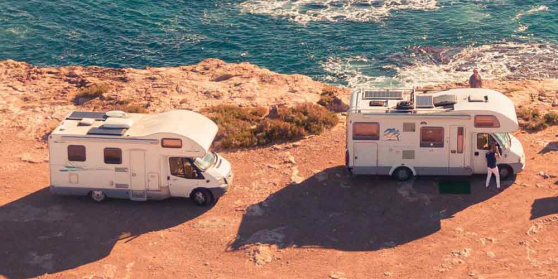
3. How do RV solar panels charge in cloudy weather?
This is another one of those “circumstances.” RV solar panels have many benefits; however, perhaps the biggest downfall is that they don’t charge well in cloudy weather.
I’m not saying they don’t work at all; I’m just saying they won’t produce the same amount they would in full sunlight.
Usually, you can just minimize your energy usage and be fine. However, some RV destinations, especially in the North, have limited sunshine at certain times of the year. In those cases, it helps to have an RV generator on hand. Solar panels do their best when the sun is directly overhead.
4. How do you clean RV solar panels?
We use solar panels for RV battery charging, and we seldom have to clean them. Dirt doesn’t affect solar panels as much as you might think. Research has shown that even in California, where they go months without rain, you’ll only see a 3% to 5% reduction in yields.
The best part is that solar panels pretty much take care of themselves. However, when you do clean them, make sure to be very careful because if you scratch one, it can affect the panel’s integrity.
When I clean my solar panels, I use a seven-foot ladder to get up there and just run a stream of clear water over them to loosen the dirt. After they’ve been hosed off, I wipe them down with a terrycloth rag, and they are good to go for another six months or so.
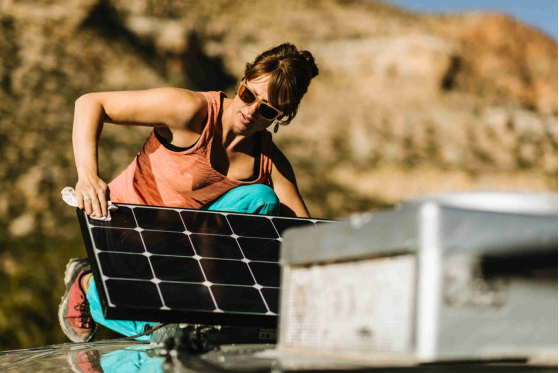
5. Does hail damage solar panels?
The short answer is yes. However, most manufacturers certify their panels to withstand hail that’s up to an inch in diameter that falls at 50 miles per hour.
Keep in mind that this is just a general statement; you’ll need to see your own type of panels’ ratings.If the hail is very small and not falling hard, then your panels will be fine. In fact, you’d be surprised how resilient they are against heavy rain and high winds.
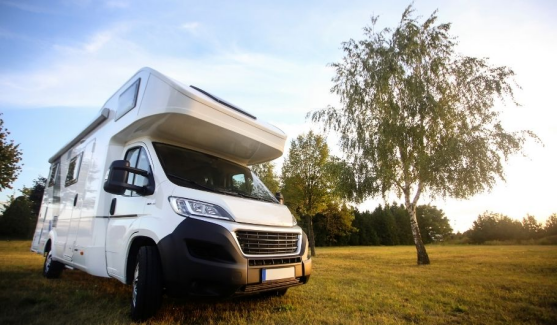
6. What are framed solar panels?
Rigid or framed solar panels are firmly fixed and hard. They are what most people think of when they picture solar panels for RVs.
These are constructed using aluminum frames and glass panes. So, if you’re looking for solar panels for RV battery charging, framed panels are a popular option. They withstand harsh weather and have a high resistance to extreme heat.
The downsides to fixed panels include are added weight to your rig, some consider them eyesores, and they can be tricky to mount around antennas, AC units, and other items on your roof.
Furthermore, they are made from glass which can break. So, you have to be careful in low clearance areas because these panels do stick up above the roof.
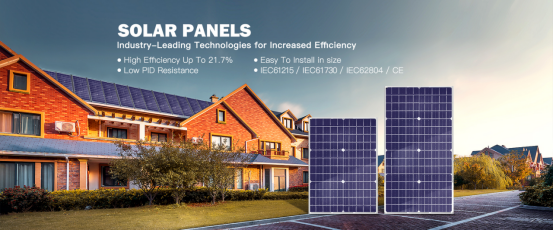
7. What are flexible solar panels?
Flexible panels are a great option when shopping for solar panels for RV battery charging. They are also known as thin-film panels and are the newest type to hit the market.
Most people like this type because they are extremely lightweight, and you can install more of them in larger spaces without adding weight to your rig.
This type of panel is still made from silicon, but they are made from far less and are still able to generate the same amounts of energy as with rigid panels.
These panels are usually installed right onto the RV roof; thus, some people prefer them because they’re sleeker and blend in better.
It’s also worth noting that some companies will tell you it’s okay to walk across flexible panels; this is not true. Doing so can actually cause them to develop small cracks under pressure. This will not only reduce the power output, but it also shortens their life.
Some say another consideration with this type of solar panel is the heat buildup. You can combat this by leaving more space between each panel, but they note that your RV can be a hot place in the summer if you don’t. Personally, we’ve had no such issues.
Finally, these panels are glued directly to the roof of your RV, so they can be difficult to remove if you decide to replace them.
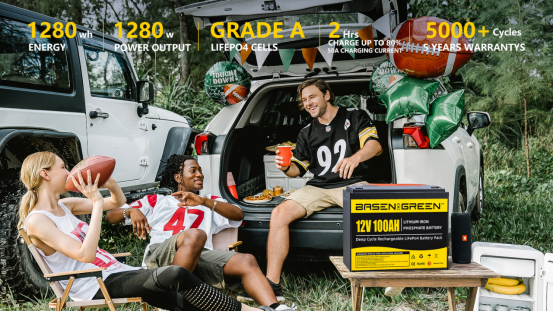
8. Should I get solar panels for RV battery charging?
In the end, solar power is a great option for weekenders and full-time RVers, and especially boondockers! They can free you from noisy and less environmentally-friendly generators, plus give you more freedom on the road.
Just be sure to choose the right solar panels for RV battery charging for your particular rig and needs. Taking the time to research and determine your needs will ensure you produce the right amount of power to keep you charged and rearing to go!








 HOME
HOME LiFePO4 vs. Lithium-Ion: Choosing the Right Battery for Your Needs
LiFePO4 vs. Lithium-Ion: Choosing the Right Battery for Your Needs  You May Also Like
You May Also Like

 Tel
Tel
 Email
Email
 Address
Address